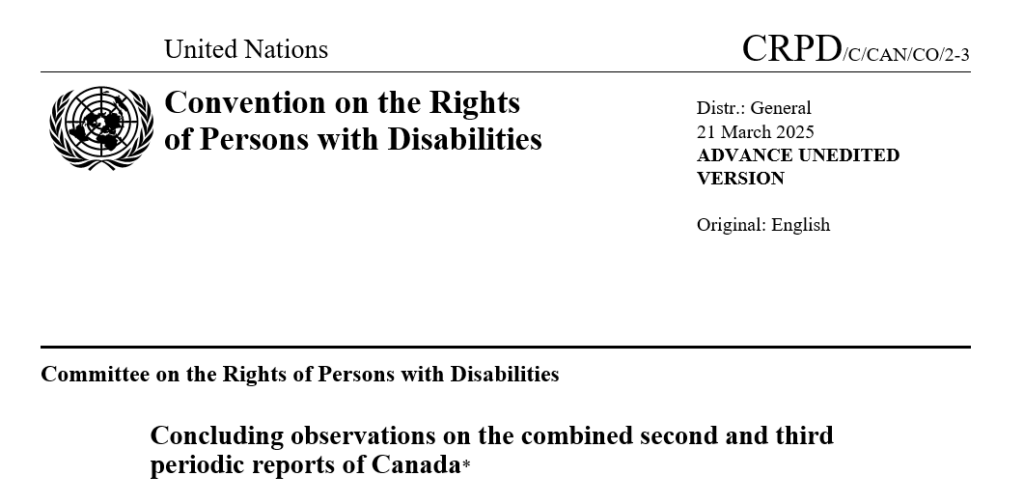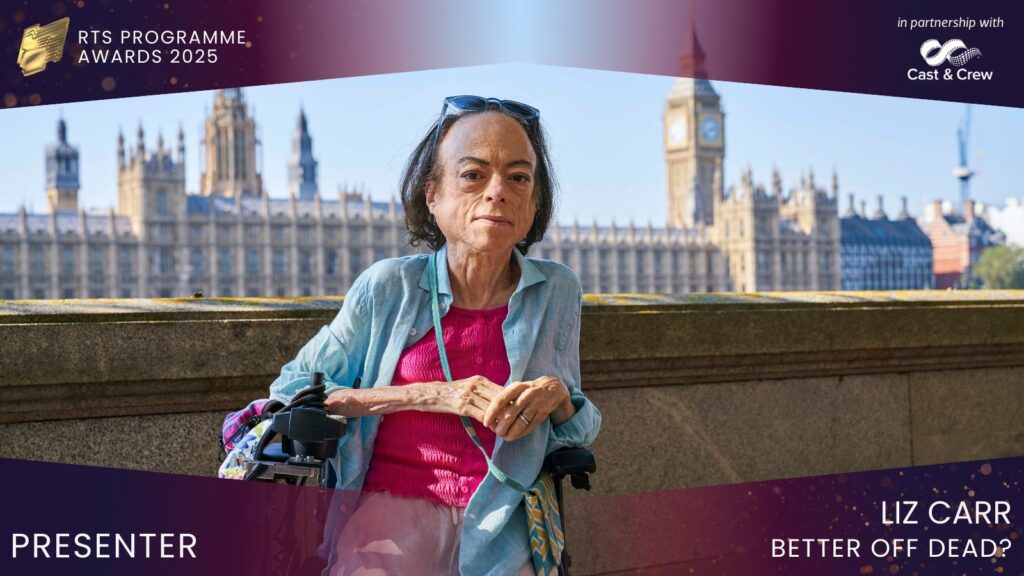Canada under review at UN

Montreal, March 27, 2025 – Yesterday, the United Nations Committee
on the Rights of Persons with Disabilities published its concluding
observations following its review of the report submitted by Canada under the
Convention on the Rights of Persons with Disabilities, on March 10 and 11.
In its 19-page
report, the Committee shares positive and negative aspects concerning respect of
the Convention. It expresses “extreme concern” only once, when discussing Track
2 Medical Assistance in Dying, which is intended for people whose natural death
is not reasonably foreseeable.
The Committee writes: “The federal government did not challenge the Quebec
Truchon decision which fundamentally changes the whole premise of medical
assistance in dying when natural death is reasonably foreseeable to a new
program that establishes medically assisted dying for persons with disabilities
based on negative, ableist perceptions of the quality and value of the life of
persons with disabilities, including that ‘suffering’ is intrinsic to
disability rather than the fact that inequality and discrimination cause and
compound ‘suffering’ for persons with disabilities”.
Its
recommendations are as follows (excerpts):
– Repeal
Track 2 Medical Assistance in Dying (MAiD), including the 2027 commencement of
Track 2 MAiD for persons whose “sole underlying medical condition is a mental
illness”;
– Not support
proposals for the expansion of MAiD to include “mature minors” and advance
requests;
– Significantly
invest and implement comprehensive measures, at federal, provincial, and
territorial levels to ensure the systemic failures in relation to the social
determinants of health and well-being are addressed,
– Strengthen
distinctions-based, community-led consultation processes with Indigenous
Peoples,
– Establish and resource
a federal independent oversight mechanism to monitor, regulate and handle
complaints in relation to MAiD.
A necessary impact on the federal election campaign
The Living with
Dignity citizen network invites all candidates in the upcoming federal election
to take note of these recommendations from the UN committee. Together with
their respective parties, they must take a position on these issues concerning
medical assistance in dying and its various extensions. These extensions have lead
to what Ms. Rosemary Kayess, Vice-Chair of the United Nations Committee on the
Rights of Persons with Disabilities (Australia) and head of the working group
on Canada, called
“a false choice” during the review on March 10 and 11.
“The
concept of ‘choice’ creates a false dichotomy by setting up the premise that if
persons with disabilities are suffering, it is valid for the State Party to
enable their death, with safeguards not guaranteeing the provision of support,
and ableist assumptions deemphasising the myriad of support options for persons
with disabilities to live dignified lives, and the systemic failures of the
State Party to address the social determinants of health and well-being, such
as poverty alleviation, access to healthcare, accessible housing, prevention of
homelessness, prevention of gender-based violence, the provision of
community-based mental health supports and employment supports” (see Concluding
observations) :
On this site can
also be found all of the interventions that lead to the Committee’s
conclusions. Living with Dignity would like to thank all the groups that made
representations to the Committee on the Rights of Persons with Disabilities
during this analysis by the United Nations.
A perfect illustration of the Canadian “false choice”, the documentary Better off dead? won an award yesterday
The British
documentary Better off dead?, which looks at medical assistance in dying
in Canada, won the Best Presenter award at the Royal Television Society
Awards on March 25. Congratulations to Ms. Liz Carr! Watching this
remarkable 58-minute documentary rapidly shows why the Committee on the Rights
of Persons with Disabilities reached the above-mentioned conclusions yesterday.
On the BBC (using VPN)
https://www.bbc.co.uk/programmes/m001z8wc
On YouTube

Screenshot of
this post from Liz Carr’s X account
https://x.com/thelizcarr/status/1904719530321997873
– 30 –
Media contact:
Jasmin Lemieux-Lefebvre
Coordinator
Living with Dignity citizen network
www.vivredignite.org/en
info@vivredignite.org
438 931-1233
MAR
2025
